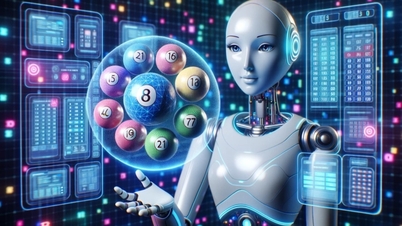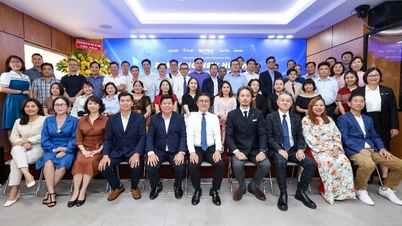In the middle of the night, when most people have fallen asleep, a woman wearing a white shirt and black skirt is still busy introducing products on Taobao - China's largest e-commerce platform. She enthusiastically points to the printers next to her, explaining their features while warmly greeting customers with endless energy. Although her movements sometimes falter and her lips move out of sync, her smile never fades.
This persistent salesman is not human, but an AI avatar—the product of a revolution that is changing the way goods are sold in China and raising a big question about the future of global sales: Will “virtual” salespeople surpass real people in the AI era?
The tireless sales machine is rising
These “virtual sales people,” developed with AI technology from Baidu and DeepSeek, are selling everything from wet wipes to printers 24 hours a day, 7 days a week, forming a tireless “sales army” operating on e-commerce platforms like Taobao and Pinduoduo.
The rise of this army is not an isolated phenomenon. Since 2022, Chinese e-commerce platforms have witnessed a wave of AI sales staff. The advancement of AI has made avatars more realistic, eyes more natural, and broadcast backgrounds more beautiful.
More importantly, the advent of large language models (LLMs) allows avatars to respond to audience comments and questions in real time.

China's e-commerce livestream market will reach nearly 5 trillion yuan in 2023, accounting for one-fifth of the industry's total revenue, with 765 million viewers - sales is the main content (Photo: Reddit).
One of the pioneers in this field is Shanghai-based PLTFRM, which has deployed about 30 similar avatars. Alex Ouairy, co-founder of PLTFRM, said these “virtual salespeople” regularly sell more than real people.
The numbers speak for themselves: Brother, a printer brand, reported that its AI avatar sold $2,500 worth of printers in the first two hours of its launch. The company’s livestream revenue has increased by 30% since switching to virtual characters.
Tech giant Baidu even went live with an AI version of Luo Yonghao, an e-commerce influencer with millions of followers. The six-hour broadcast attracted more than 13 million views and generated 55 million yuan ($7.7 million) in sales.
Why are AI avatars superior to humans?
To explain the success of virtual salespeople, we need to look at the natural limitations of humans. Alex Ouairy, co-founder of PLTFRM, explains: “A human can only livestream for 3-4 hours before his voice gets hoarse and tired. At that point, a virtual character will take over.”
Sales data also shows that real people's sales are often better at first, but then gradually decrease due to exhaustion. Livestreaming with real people is very hard work, that is, introducing products, interacting with the audience, preparing for the next dish. Concentration decreases, they smile less and are less attractive. In contrast, virtual characters have a stable, unchanging attitude.
First, AI avatars operate 24/7, 365 days a year. This is a huge advantage as livestreaming has become the most powerful marketing channel in China. By 2024, more than a third of China's total e-commerce sales will come from livestreaming, and one in two people have made a purchase via livestream.
Thanks to AI avatars, brands can take full advantage of livestreaming without worrying about labor costs or the health of salespeople.
Second, AI avatars have the ability to completely standardize the sales process. They are programmed to introduce products, greet audiences, and answer questions according to an optimal scenario.
With the help of LLM, they can also answer audience questions in real time with full product information. This is the standard that many commercial organizations have long pursued. They never get frustrated, never lose focus, and always maintain an enthusiastic attitude towards customers.
Finally, AI avatars are a cost-effective solution. The AI sales trend also goes hand in hand with the shift in China: from hiring KOLs to promoting to stores opening their own sales channels, using bots to save costs. This is a signal that businesses are looking to gradually reduce their dependence on influencers.
Selling in the AI Era: Advantages and Limitations
Despite their effectiveness, AI avatars do have their weaknesses. One incident that went viral was when an avatar selling spa packages was “hacked” by inserting a prompt into live commentary, causing it to meow continuously for 46 seconds. This showed the vulnerability of the technology and its inflexibility in handling unexpected situations.
According to experts, these avatars are only good at presenting products and answering frequently asked questions. They lack the ability to handle complex situations or build relationships. Humans can read between the lines, improvise flexibly, negotiate creatively and foster trust - core elements, especially in large B2B deals.
Trust is the most obvious limit. While Chinese consumers may accept everyday purchases from virtual agents, decisions worth hundreds of thousands of dollars or multi-year contracts still require human involvement. For high-value products, direct interaction, sincerity and professionalism from salespeople are still the deciding factors.
However, with the rapid development of AI, it is not difficult to imagine a future where social networks are flooded with content and virtual characters selling products around the clock. American and European companies have also shown interest in building virtual “salespeople” on Western social media platforms. Perhaps, this will be the next global trend.

The initial boom and success of AI avatars raises the question: can they replace people who make a living by livestreaming sales on TikTok or affiliate marketing through TikTok Shop? (Photo: The Quota).
For now, experts still see the technology as complementary. Alex Ouairy points out that bots act as salespeople in physical stores, while social media influencers are still needed to drive customers into stores. Many companies adopt a hybrid model: real employees livestream for a few hours, then give way to AI avatars - a combination of authenticity and technological durability.
The rise of the virtual salesperson raises questions about the future of sales. Will sales professionals be replaced? In fact, AI can take over routine, repetitive, technical tasks, allowing humans to focus on higher-value tasks.
The successful salespeople of the future will not be those who compete with AI, but those who know how to exploit AI tools in parallel with the ability to bring “only human” value.
It’s about empathy, creativity, emotional intelligence, and the ability to build relationships. A good salesperson in the AI era needs to know how to use automation tools to manage leads, analyze data, and optimize processes. This frees up time to focus on consulting solutions, negotiating contracts, and cultivating customer trust.
AI can recommend products 24/7 without getting tired, but only humans truly understand what customers need.
Source: https://dantri.com.vn/kinh-doanh/nhan-vien-ao-de-doa-nghe-ban-hang-o-trung-quoc-con-nguoi-co-that-nghiep-20250911192251529.htm

































































































Comment (0)